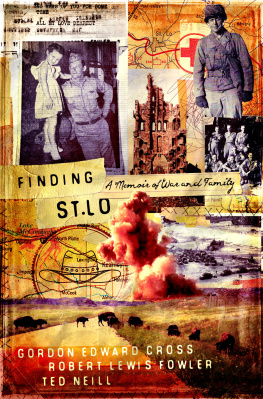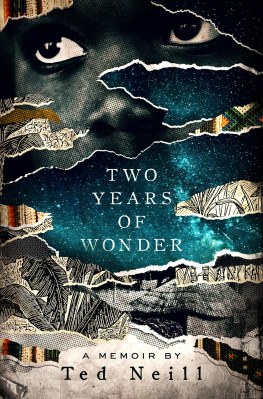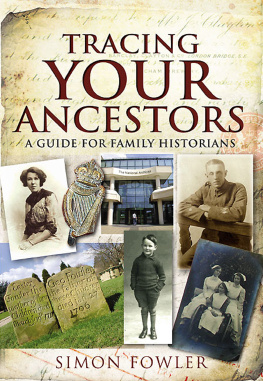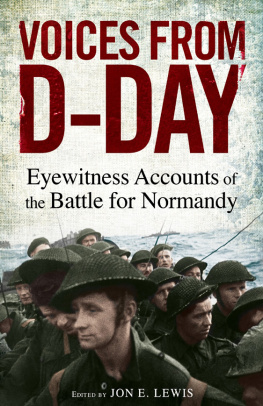FINDING ST. LO
A Memoir of War and Family
By
GORDON EDWARD CROSS
ROBERT LEWIS FOWLER
TED NEILL (Editor)
REFLECTIONS I.
Grampa Fowler
Ted Neill
I only ever had one Grampa. That was Bob Fowler. Grampa was what I and all his other grandchildren called him. Like everyone else, I, of course, had two grandfathersbut I had only one Grampa.
Robert Lewis Fowler was my mothers father. My dads father, Charles Waggaman Neill, was appropriately named Dads Daddy since (Im told) I met Grampa Fowler first and wholeheartedly accepted him as Grampa and insisted ever after (as only children with zero tolerance for ambiguity can) that there could be only one Grampa.
Grampa Neill was not to be.
But Grampa Fowler, Major Robert Lewis Fowler, Bob, was a challenge for me and for all of his family. He was never just one thing. Who is? But Grampa, as an individual man of his era, a symbol of his generation, and even as an archetype of the warrior, defied easy categorization, to say the least, characterization.
Grampa Fowler was, without a doubt, a war hero. He was a man who faced the crucible of battle, bearing witness to the horrors of modern warfare. The carnage of World War II was not abstract to him. For a few weeks in the summer of 1944, he was anointed from head to toe with the mud, dirt, and shit of battle, not to mention bloodhis blood and his comrades bloodas munitions blew men, his friends, into pieces alongside him. This violence would wound his body, break his heart, and shatter his psyche.
Robert Lewis Fowler was a father. A grandfather. A son. A brother. A husband. He was a handsome, steely-faced, taciturn midwestern man. A slow talker. So much so, that you could interject complete sentences in the lacunas between his wordsif you dared to interrupt him. But no one ever did, not even my fast-talking, polyglot father, raised in New Jersey, a man who had attended elite boarding schools on the East Coast and centuries-old universities in Europe. Nervous, fast talking was in his bloodstream, even when he had nothing useful to say. But even he learned to slow down and settle into Grampas flow.
Grampas slow talk never came off as indicative of a slow mind. You never doubted for an instant that there was a keen intellect behind Grandpas eyes. They were piercing, honed like the sharpshooter and map reader that he was. His gaze was steady, accustomed to long drives along highways with bleached, baked, and battered asphalt. These were ribbons of road cracked by the weight of winter snows, scoured by spring storms, and hammered by summer sun. These long routes trace lines across a prairie that imposes silence between travelers. Small towns are separated by space and time, hours of travel along unbroken vistas of grass rolling on hills like ocean swells and spangled with wild flowers. The scope of it all is dwarfed only by the big sky that even sunsets and mountain ranges of cumulonimbus cant fill.
You just understood in Grampas presence that he had his own cadence. He moved at his own pace, as if tied to the earth he had grown up hoeing, sowing, reaping and baling upon. This pace was not agitated. It was never nervous. And in Grampas presence, as if by force of his own gravity, you simply fell into his rhythm. You didnt question; you just accepted. It was a restorative surrender, a bit like how I imagined Huck Finn and Jim, pushed along in their raft in the Mississippi; or just reading the actual novel, riding along on Mark Twains words, the pace of the plot all his, not yours. Youll get to your destination, sure as the river flows and the page turns. You never doubt that. The laws of nature guarantee it. Just keep floating. Just keep flipping. But ultimately, we are powerless as to when we will arriveat our destination, at the conclusion and whatever resolution it brings (if any). So, you wait, you float, you move word by word. You let the flow move things around you. You watch. You observe. Most of all, you listen. Its a way of being that, today, I fear we have mainly lost.
As a result, you felt calm in Grampas presence. Safe. He was reassuring. I could see how men would want to follow him. Impervious. Unflappable. This natural calm translated into an aura of authority, a calm in battle and a sangfroid even before 4-star generals who would come to review him and his company. Grampas commanding officers always positioned him in a place where the generals coming for review would encounter him first, hoping they might speak with him and he represent the company of men. They knew Grampa was respectful of authority but never flustered by it.
Grampas presence loomed large for those of us in his family, just as his generation occupies a prominent place in twentieth century history. His story, his heroism, his endurance, signified by the campaign bars, the bronze star, and the purple heart that lined his medal case. His generations grit honored with titles such as Greatest.
But there was more to Robert Lewis Fowler. In addition to these identities, there were other, darker ones. He was a careless, reckless, belligerent drunk. At times, so was his wife Evelyn.
Grampa was a neglectful father, an unfaithful husband, a disappointment to his children, and a wreck of a man. These were shadow identities for Grampa, shadows his grandchildren only saw themselves towards the end of his life. We mostly knew him during the decades he was sober. It was mostly in imagination that we knew this side of him even existed. Growing up, we heard that past times had been worse and that there were rifts yet to be healed. But this knowledge came secondhand, through the stories shared by my aunts.
The evidence of shadows also lay in my mothers own journey. My mother, Kathleen, was the oldest of eight children. Once grown, she moved from her hometown of Omaha, Nebraska, to Washington, DC, to flee from her family and the chaos of her parents relationship. But that, having taken place before I was born, always seemed like ancient history to me.
These stories of Grampa and Evelyns dark times were not volunteered freely. My cousins and I only caught bits and pieces, either through unexpected admissions or casual asides. These were breadcrumbs for us to follow at our own risk.
My mother once spoke of coming home from college to find the youngest two children, Joe and Sally, playing with broken beer bottles in place of toys. My aunt Mary Anne described Grampa picking her up at a friends house once blind drunk. He drove her home, speeding and swerving through the streets of downtown Omaha at a time when seatbelts were not commonplace. By some miracle they made it home, bouncing over the curb, the car coming to a stop on the lawn before Grampa staggered out to sleep it off in the grass.
There were times Mom laughed and said she came from white-trash. Other times, she cried.
Over time, I learned that my own mothers attachment to my childhood home was even in reaction to her itinerant childhood. She and my father purchased their home in 1980 and have lived there since, never moving or relocating. I spent the entirety of my formative years in that home. But more importantly, that house has been a home to my mother longer than any other because, growing up, her parents were constantly being evicted from one house, then anotherfor drunken behavior, property damage, delinquent payments, too many children, or all four.
The stories Mom told of these years were sparse, but the pain was all too apparent. I glimpsed it when she spoke of telling her father no shortly before Christmas one year when he once called asking for money. He said they needed it to keep the heat and lights on.
Mom had established her own career as a nurse by that point in her life. She was independent and free. But she was torn apart by the idea of her youngest two siblings, Joe and Sally, living in such privation. But she knew she could not trust her father to follow through and spend any money she sent to him on her siblings. Sending anything, she knew, just enabled his drinking. Mom was also worried that Evelyns depression was manifesting as continued drinking and even reckless gambling.











![Neill - The space [within]: finding your way back home](/uploads/posts/book/222935/thumbs/neill-the-space-within-finding-your-way-back.jpg)


